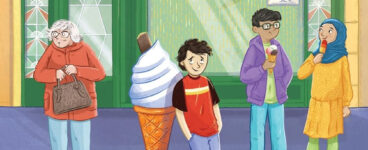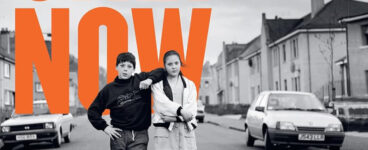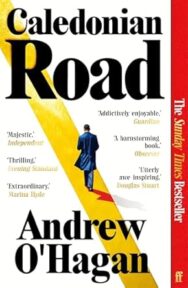David Robinson Reviews
‘Who else, you might well ask, has the chutzpah and the talent to cover a waterfront as wide as this, to write with credibility about disgraced tycoons and people smugglers, sweatshops and culture wars, black gangs and white grandees?’
In this review of Caledonian Road, David Robinson explores Andrew O’Hagan’s journalism as an influence in his latest novel.
Caledonian Road
By Andrew O’Hagan
Published by Faber
The internet’s no help. Type in ‘Andrew O’Hagan’ and ‘foot and mouth’ and ‘slaughtermen’ and ‘South Ayrshire’ and it gives an apologetic shrug, which I half-expected anyway: it was, after all, 2001 or some such distant, as yet undigitised date. The Word Festival in Aberdeen, at which O’Hagan gave a reading that left me lost in admiration, vanished into memory more than a decade ago, and the book he was reading from – The End of British Farming, republished from a long essay he wrote for The London Review of Books – has almost certainly followed it.
What made such a deep impression on me wasn’t that essay but something else he read – a first-person newspaper feature about accompanying one of the killing teams slaughtering herds of cattle and sheep infected with foot and mouth disease which was, at the time, rampant. That year, six million beasts were killed, and the fires from the pyres of their carcasses blighted the countryside. Like everyone else, I knew this was happening, but it didn’t really register. And then O’Hagan read that piece about the animal holocaust going on around us and the human lives it was wrecking, and I felt, to my complete surprise, so moved by it that I can still remember it more than two decades on.
Ever since then, I have known that whatever else he is as a writer, O’ Hagan is also a great journalist. My working definition of this is simple: someone who tells you stuff about your country that you don’t know is going on. More than that, though, it also requires being able to bring a subject to life and realising that there’s life in practically every subject too. To that extent, O’Hagan is very much like the father of the central character in his novel Be Near Me, who says that he only realised he was grown up ‘when I could read the local newspaper from cover to cover and find every item interesting.’
In one sense, his latest novel, the 641-page Caledonian Road, is a local newspaper: most of its characters live on or near the eponymous road that runs north for a mile from King’s Cross, or are closely connected with someone who does. But just one look at O’Hagan’s cast of characters, which range from dukes to gangsters, Russian oligarchs to bishops, human traffickers to jet-setting DJs, supermodels to sweatshop workers, tells you that it’s more of a national than a local publication. He is, finally, going the full Dickens: this is unambiguously a state-of-the nation novel. And the nation, at least in this portrait of it, from the end of Covid in May 2021 to Russian invasion of Ukraine, is in a hell of a state.
Campbell Flynn, his central character, is a cultural commentator, a biographer of Vermeer who is now slumming it by writing – for heaps of cash but on conditions of anonymity – a male self-help book called Why Men Weep in Cars. Would Flynn himself be the kind of man who would do that? At the start of the book, no: he has a successful career as the host of a podcast called – with more than a nod to Freud – Culture and its Malcontents, as well as a visiting professorship in English at UCL, and a stack of freelance work, such as providing the words to help launch a fashion collection and giving the prestigious Autumn Lecture at the British Museum. He has a house in Islington’s leafy Thornbury Square, is the brother-in-law of a duke, one of his best friends from Cambridge is a retail tycoon, his sister is a Labour MP, his son a jet-setting DJ and daughter a supermodel who looks like Linda Evangelista. All in all, it’s a long way away from his working-class childhood in a Glasgow high-rise.
It’s not giving too much away to say that by the end of the book, only a few of these apparently solid pillars of Establishment will remain standing. Flynn already has a half-suspicion that he is a middle-aged phoney, that the cultural world is moving out of his intellectual grasp, so when one of his brightest students, a half-Ethiopian, half-Irish computer whizz and cultural malcontent critiques his podcast, he listens. He learns too: about the inequalities his assumptions are based on, about how the internet is changing our minds and what we look for in art. What we need even more than the looted objects in the British Museum (largely founded, he points out, on the collection of slave-owner and eugenist Sir Hans Sloane) is transparency: only when the treasures Britain took to burnish its own so-called civilisation have been returned will we be able to start afresh with a newer, better one.
Yet while O’Hagan’s novel has plenty of room for such culture wars skirmishes, the real meat of the plot lies in its dissection of crime and corruption in both high and low places. For even though you’ll be able to find plenty solidly haut-bourgeois mansions such as Fynn’s just off Caledonian Road, the Vietnamese illegals crammed into flats in Paradise Park and Polish people-smugglers working the King’s Cross cashpoints with their victims’ credit cards aren’t too far away either. Only a revolutionary’s stone-throw away, we’ll find a plutocrat’s Extinction Rebellion-supporting son relaxing in his £7.5 million pad on (oh, the irony) Coal Drops Yard. Thirty years ago, somewhere like that was a seedy backwater. Now there’s Eurostar, the new Google offices, and UK headquarters of Expedia and Facebook. ‘It’s the centre of London now,’ Flynn points out.
And London itself? Well, if you’ve read Oliver Bullough’s 2022 book Butler to the World: How Britain Became the Servant of Tycoons, Tax Dodgers, Kleptocrats and Criminals you’ll get an idea of the city O’Hagan’s novel portrays. It’s a place ridden with oligarchs’ money, with consequences for both art dealers (‘We paid $35 million too much for those Bacons’) and society at large (‘You know the Russians paid for Brexit, right?’ says an editor. ‘It was their money made the Tories believe London was invincible.’)
If absolute power corrupts, O’Hagan’s novel suggests, so too does the oligarchs’ absolute money. It props up the finances of stately homes, squeezes its way onto the balance sheets of our top businessmen, suborns politicians and influencers, and fuels jet-setters’ mad weekends to an Icelandic restaurant that’s ‘the only place in the world right now where you should eat Indian food.’
There are, in other words, so many worlds within this novel, and at the gaudier end (‘the last time Tara saw Bo he was sitting next to one of the young royals at a Rolex party thrown by Chinese Vogue at Sartorial’) they gleam with some of the madness that so attracts us to TV dramas like Succession. But there’s grime too, and it’s drawn equally realistically: an entirely credible Leicester sweatshop making garments for a disgraced tycoon, Vietnamese immigrants fleeing ecological disaster in their homeland freezing to death in a people smuggler’s lorry or working in Kent cannabis farms or black London gangs fighting a pointless turf war.
A novel this big, this ambitious, is bound to attract detractors. Some of them will point out that, as a portrait of society it leaves out practically everything and everyone who isn’t involved in a glitzy career (fashion, media, aristocracy, showbiz) or a criminal one (crooked businessmen, cybercrime, drugs gangs, people smuggling). And yes, they’ll have a point, if a rather feeble one. True, the world isn’t entirely as glitzy or criminal as this, just as Thackeray’s Vanity Fair was hardly an entirely accurate portrait of 1847 Britain and there were few if any mid-Victorian women like Becky Sharpe. Satire is like that. It exaggerates, but it’s based on truth.
Finally, I’ll go back to 2001. If any other writer went around the South Ayrshire countryside with the foot and mouth slaughtermen, I never got to read about it. It’s the same with Caledonian Road. Who else, you might well ask, has the chutzpah and the talent to cover a waterfront as wide as this, to write with credibility about disgraced tycoons and people smugglers, sweatshops and culture wars, black gangs and white grandees? But there’s even more to it than that. A good journalist isn’t just interested in all aspects of society, but knows something else too: how a story shakes down; how it grows from a hint to a rumour to an actual front-page exclusive, with all the consequences it then unleashes. A good journalist knows what a story looks like at every one of those stages. Which is why I’ll say it again: Andrew O’Hagan is a heck of a journalist. He is, of course, a brilliant writer too, as this enjoyable and thought-provoking novel proves once again, but by now I’m sure you know that already.
Caledonian Road by Andrew O’Hagan is published by Faber, priced £20.
ALSO IN THIS ISSUE

 Ice Cream Boy by Lindsay Littleson
Ice Cream Boy by Lindsay Littleson
‘My hope is that reading Ice Cream Boy might develop children’s empathy and understanding of dementi …

 Only Here, Only Now: Q & A with Tom Newlands
Only Here, Only Now: Q & A with Tom Newlands
‘I wanted to write a really vivid book that could tackle some heavy subject matters with warmth and …













